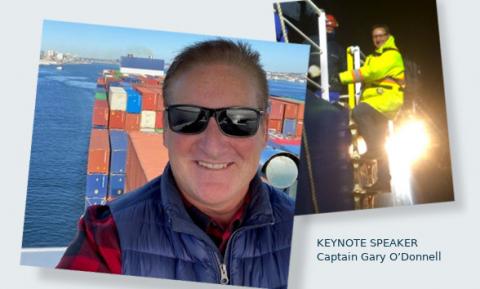Friends of McNabs Island Event
‘Halifax Harbour Pilotage, Then and Now’ – A special presentation at the Friends of McNabs Island Society’s Annual Meeting Monday, April 8 2024

HALIFAX--The marine pilot profession has evolved greatly since the early days of sailing ships in Halifax
Harbour. Piloting has become regulated and certified, and its pilots now undergo apprenticeships with
rigorous training and qualifications.
Captain Gary O’Donnell will give a historical overview of marine piloting in Halifax Harbour at the
society’s 34 th Annual General Meeting on Monday, April 8 th . The meeting will be held at the Nova
Scotia Museum of Natural History, 1748 Summer Street in Halifax. Doors open at 6:30 p.m. with the
meeting starting at 7:00 p.m. in the auditorium of the Museum. All are welcome.
“The main responsibility we have as pilots today is to ensure the safety of the public for marine
shipping in and out of our harbour,” says Capt. O’Donnell, a graduate of the Canadian Coast Guard
College and a veteran of more than 10 trips in the polar waters of Canada’s North.
Capt. O’Donnell, a retired master mariner whose decades-long career includes more than 20 years of
piloting vessels in Halifax Harbour, will outline key events in piloting history. His talk will describe
measures aimed at safeguarding navigation for ship traffic in Halifax Harbour. He will discuss the
history of his field, illustrated with a few archival photographs. The pictures show how piloting has
modernized itself from a time when schooner-based pilots used rowboats to board incoming vessels.
Most recently employed by the Atlantic Pilotage Authority, Capt. O’Donnell says the local pilotage
system has been “incident-free” for 99.9 per cent of vessels. The impressive safety record, he adds, has
been sustained even with the increasing number of larger-sized vessels.
Halifax has a naturally deep, wide, ice-free harbour with minimal tides. The harbour was called
Kjipuktuk by the Mi’kmaq. They were the original inhabitants of the land and the first navigators of the
seaway and the connecting river waterways. Halifax is one of a few eastern seaboard ports able to
accommodate the very largest container ships. Annually, the port handles over 1,500 vessels, ranking it
among Canada's top four ports by container volume.
It was the 1917 Halifax Explosion that, over time, brought system-wide piloting changes. The disaster
of December 6 was caused by the collision of the munitions ship, Mont Blanc, and the relief supplies
ship, Imo. It devastated the north end of the city, killed almost 2,000 residents and left 9,000 more
maimed or blinded.
The tragedy also created controversy, still debated and disputed, of the role of pilot Frances Mackey.
Until the collision, Mackey had a spotless twenty-four-year service record as a harbour pilot. But after
the collision, Mackey was vilified in press coverage and arguably made the scapegoat in court
proceedings.
Capt. O’Donnell offers his professional perspective. “Seven years ago, we observed the 100 th
anniversary of the Halifax Explosion and the role the pilots played and endured after this terrible
occurrence. It could be said that this event was a defining moment on the role of how pilotage evolved
and changed, not only in Halifax, but across the country.”
Although there had been changes in the industry before the explosion, more substantial changes ever
since are transforming the industry. Among the significant milestones was the 1968 Royal Commission
on Pilotage. This resulted in the Pilotage Act and the 1972 establishment of the Atlantic Pilotage
Authority.
Nowadays, Capt. O’Donnell explains, becoming a fully licensed pilot only takes place after a rigorous
program. Newly hired apprentice pilots undergo three years of training, completing hundreds of
assignments under the supervision of a senior pilot.
While candidates tend to be younger, in their mid-30s, they also have a sophisticated level of expertise,
Capt. O’Donnell says. Education for pilots places a high priority on an intimate knowledge of local
waters, and specialized training on the most up-to-date ship equipment and simulation facilities.
O’Donnell himself has a Class A piloting license that qualifies him to pilot vessels of any size, and any
tonnage, in and out of Halifax Harbour. He says: “Pilot apprentices bring with them a more technically
oriented background. Many of them were previously employed in highly technical backgrounds, for
example the oil patch, or the chemical and product carrier industry.”




